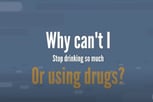Grief occurs during death or loss. The loss can be as seemingly insignificant as a lost earring or, for a child, a missing toy. Conversely, grief can occur with the loss of a loved one, job, relationship or behavior. If you’re an addict, there’s a strong likelihood that you may have lost all three.
Addiction is a disease which involves every aspect of an individual—body, mind and spirit. Therefore, the dysfunctional behaviors and resulting feelings meshed with the process of active addiction can become a seemingly instinctual part of the person. That is why when an individual enters treatment and recovery, he or she also begins a significant grieving process.
Saying Goodbye When It Hurts
An addict's relationship with drugs and alcohol is an intimate one. In fact, with regard to an active addict, it is likely the only truly close relationship left standing, which can explain the reason behind the defensiveness that occurs whenever the active addict is confronted about their disease. They will do and say almost anything in an effort to protect the substance of choice, their fragile yet exaggerated ego and the addiction, itself.
The aforementioned three—the substance of choice, ego and addiction—are no longer just aspects found in an active addict. They become the very definition of the person. In other words, addicted individuals become their addiction and all that it entails. That is why many times, their manipulative and dysfunctional behaviors are typically explained away with well-known phrases, such as “That’s the addiction talking.”
So when a person decides to enter addiction treatment, they are in essence making a choice to give up their identity, or at least the identity that they’ve come to know of themselves. That fact, alone, is a potentially devastating loss which leads to a great deal of fear and confusion. This can be the reason people postpone or refuse treatment altogether. It also explains a great number of relapse situations in which the loss is too overwhelming and not enough is done to assist the recovering individual with the grief process.
Though it’s hard to think of it this way, active addicts entering treatment are giving up the one coping mechanism and “true friend” they have learned to rely on. For some, their substance of choice is not merely an escape route for emotional pain but as a way to feel normal amidst underlying mental health issues such as depression, anxiety or other mood disorders.
The Time is Now
All of these are valid reasons for individuals to feel a great deal of fear when contemplating or entering into treatment. It’s the same level of fear that one might feel when considering the process and potential consequences of getting a divorce. But, as with any chronically dysfunctional or abusive relationship, the relationship with drugs and alcohol has to go. Regardless of the grief that will undoubtedly follow, the new life and freedom that you will enjoy is well worth the temporary pain of letting go.
To allow for a successful recovery to take place, it is vital to get a counselor, recovery coach or other helping professional involved to address the grief that comes with having to leave the addiction behind. More importantly, seek the assistance of addiction and recovery specialists who can help you say hello to a completely different identity, one associated with recovery and personal growth. Like the healthy, nurturing relationship one hopes to find after moving on from a previous bad relationship, recovery also starts a brand new relationship with yourself—the new and improved you who’s ready to take on the world.
If you or someone you know is seeking professional help, please visit our directory of counseling and therapy centers or call 866-606-0182 to start the path to recovery today.








